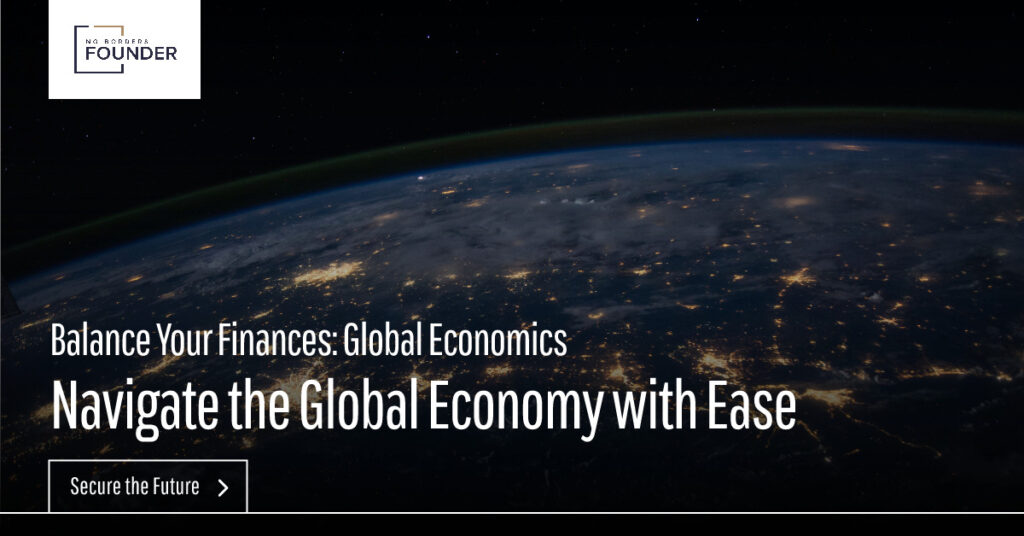Insights into the Intricacies of Economic Equilibrium and the Role of No Borders Founder in 2023

Embracing the Global Economic Landscape of 2023
As the world spins into 2023, we find ourselves balancing on the edge of economic uncertainties. Like navigating a ship through stormy seas, understanding the elements that threaten our economic stability becomes crucial. Through this comprehensive analysis, we aim to unravel the intricate tapestry of global economic challenges and their potential implications.
This new economic dawn is not without its shadows. In the uncharted terrain of 2023, five major economic factors stealthily shape the global economic landscape. Each section of this article dives deep into a unique aspect of global economic stability, shedding light on how it influences our interconnected world. This insightful journey takes us through the rise of inflation, geopolitical tensions, the unpredictable force of climate change and natural disasters, the stealthy threat of cybersecurity, and the widening gap of income inequality.
By understanding these influences, we can cultivate the wisdom to make informed decisions that foster economic prosperity for ourselves, our businesses, and our communities. Now, let’s set sail on this voyage of economic discovery.
Decoding Inflation: The Hidden Cobra
The modern financial ecosystem is no stranger to the lurking serpent that is inflation. After a period of dormancy, this cobra has reared its head again in 2023. For businesses, governments, and individuals worldwide, understanding and navigating this economic challenge is paramount.
Inflation – the rate at which the general level of prices for goods and services is rising – can lead to a decrease in the purchasing power of money. The causes of this resurgence are manifold, from supply chain disruptions to economic recovery and expansionary fiscal policies. For consumers, inflation can lead to higher living costs, creating a strain on personal finances and savings. For businesses, inflation can increase operational costs, disrupt financial planning, and potentially destabilize markets.
Navigating Through the Waters of Geopolitical Tensions
Geopolitical tensions are not a new concept. From the Cold War to the ongoing conflicts in the Middle East and Eastern Europe, geopolitical disputes have long had the potential to disrupt global economic stability.
In 2023, the world is witnessing an escalation in these tensions, particularly between economic giants such as the United States and China. Trade wars, political disagreements, and competing interests often translate into economic uncertainty. This has profound implications for international commerce, investment, and economic policy, and can lead to potential disruptions in energy supplies.
Climate Change and Natural Disasters: Unpredictable Juggernauts
The impact of climate change and the resulting increase in the frequency and intensity of natural disasters pose a significant threat to global economic stability.
Climate change is not just an environmental issue; it’s a growing economic threat that can result in billion-dollar damages, disrupt supply chains, decrease agricultural productivity, and increase food prices. In 2023, the world has witnessed a surge in the severity of hurricanes, wildfires, and droughts, leading to substantial economic losses.
Cybersecurity Threats: The Silent Assassins
As we become more interconnected and reliant on digital technology, cybersecurity threats have become a paramount concern for businesses, governments, and individuals alike.
From ransomware attacks to data breaches, the digital landscape in 2023 is fraught with challenges. Cybersecurity threats can lead to significant financial losses, damage reputations, and undermine consumer trust. In an increasingly digital world, the economic implications of these threats are vast and complex.
Rising Income Inequality: The Invisible Divide
Income inequality has emerged as a pressing global concern, threatening social stability and economic growth.
In 2023, the divide between the rich and the poor continues to widen. Income inequality can lead to social unrest, reduce economic growth, and limit poverty reduction. To maintain global economic stability, it’s crucial to address this imbalance through proactive policy measures and corporate social responsibility initiatives.
Proactive Solutions for Global Economic Stability
To ensure global economic stability, proactive steps from both businesses and governments become indispensable. From adopting robust cybersecurity measures to fostering sustainable business practices and reducing income inequality, these efforts can ensure a robust and resilient global economy.
In 2023, effective solutions are focused on increasing economic resilience, promoting sustainable growth, and enhancing cooperation at the international level. Through collective effort and collaboration, it’s possible to navigate the economic challenges of 2023 and maintain stability.
Role of No Borders Founder in Fostering Economic Stability
As pioneers in their field, the No Borders Founder has the power to influence this trajectory. Their work in promoting cross-border collaborations and breaking down barriers to international trade and commerce can foster economic stability.
In 2023, they continue to lead the way in global economic resilience. Through their innovative initiatives and active engagement with international businesses and governments, they contribute to a stable and prosperous global economy.
FAQs: Illuminating the Complexities of Global Economic Stability
To further clarify the nuances of our current economic climate, here are the most frequently asked questions about global economic stability in 2023, along with detailed answers.
What are the key factors influencing global economic stability in 2023?
Several factors impact global economic stability in 2023, including inflation, geopolitical tensions, climate change, cybersecurity threats, and income inequality.
How does inflation affect the global economy in 2023?
Inflation affects the global economy by increasing living costs, reducing purchasing power, and potentially causing economic instability.
What are the potential consequences of escalating geopolitical tensions?
Escalating geopolitical tensions can disrupt international trade, hinder economic growth, and lead to uncertainties in energy supplies, impacting global economic stability.
How does climate change pose a threat to global economic stability?
Climate change intensifies natural disasters, such as hurricanes and wildfires, which can cause economic disruptions, damage infrastructure, and reduce agricultural productivity.
What are the economic implications of cybersecurity threats in 2023?
Cybersecurity threats can result in significant financial losses, disrupt critical services, erode public trust, and hinder economic growth.
How does rising income inequality impact global economic stability?
Rising income inequality can reduce consumer spending, hinder economic mobility, and create social unrest, leading to economic imbalances and instability.
What measures can businesses take to mitigate economic risk factors in 2023?
Businesses can diversify supply chains, invest in risk management, adapt to changing economic conditions, and promote social responsibility to mitigate economic risk factors.
What role can governments play in addressing global economic challenges?
Governments can implement comprehensive policies, strengthen international cooperation, invest in infrastructure, promote social equality, and support economic resilience to address global economic challenges.
How can individuals prepare for potential impacts of global economic risk factors?
Individuals can stay informed, diversify income sources, invest in education and skills, and engage in sustainable practices to prepare for potential economic impacts.
Can international collaborations help foster global economic stability?
Yes, international collaborations and partnerships can enhance economic stability by promoting trade, cooperation, and sharing best practices among countries.
How can sustainable practices contribute to global economic stability?
Sustainable practices, such as renewable energy adoption and responsible resource management, can contribute to long-term economic stability by reducing environmental risks and promoting efficient resource allocation.
What role does technological innovation play in achieving economic stability?
Technological innovation drives economic growth, improves productivity, and fosters innovation-led economies, contributing to long-term economic stability and competitiveness.
How can education and skills development contribute to economic stability?
Investing in education and skills development enhances human capital, increases productivity, and fosters innovation, leading to economic stability and growth.
What are the potential long-term benefits of addressing global economic challenges in 2023?
Addressing global economic challenges can lead to sustainable economic growth, reduced inequality, increased social welfare, and enhanced stability in the long run.
What role does No Borders Founder play in fostering economic stability?
No Borders Founder plays a vital role in fostering economic stability by advocating for cross-border collaborations, breaking down barriers to trade, and promoting equitable economic practices.
These frequently asked questions shed light on the complexities of global economic stability in 2023, providing valuable insights for individuals, businesses, and governments aiming to navigate the ever-changing economic landscape.
Looking Beyond the Horizon
As we reach the conclusion of our journey through the intricacies of global economic stability in 2023, one thing becomes abundantly clear: the fate of our economic future lies in our collective hands. It is a call to action that resonates not just with businesses and governments, but with every individual seeking a better world.
We stand at a critical juncture, where the choices we make today will shape the destiny of generations to come. The challenges we face – inflation, geopolitical tensions, climate change, cybersecurity threats, and income inequality – may seem daunting, but they are not insurmountable.
In this moment of truth, we must rise above our differences and unite in the pursuit of economic harmony. We must harness the power of innovation, collaboration, and compassion to forge a path towards a stable and prosperous global economy.
No Borders Founder stands at the forefront of this movement, championing the ideals of inclusivity, collaboration, and equitable progress. Their vision transcends borders, bringing together minds from diverse backgrounds to create a future that is not bound by limitations or divisions.
It is a future where businesses thrive, governments prioritize the well-being of their citizens, and individuals have equal opportunities to succeed. It is a future where the benefits of economic growth are shared by all, leaving no one behind.
Together, we can overcome the obstacles that stand in our way. We can build a world where economic stability is not an elusive dream, but a tangible reality. Let us embark on this journey, hand in hand, with a shared purpose and unwavering determination.
The time for action is now. Let us look beyond the horizon and pave the way towards a brighter future, where global economic stability becomes the cornerstone of a prosperous and harmonious world. Together, we can make it happen.
Join No Borders Founder in shaping the future. Together, we can break down barriers, bridge divides, and create a world where economic stability knows no boundaries. Together, we can turn the tide and make a lasting impact. Together, we can achieve economic stability for all.
#GlobalEconomicStability #2023Economy #InflationAnalysis #GeopoliticalTensions #ClimateChangeImpact #CybersecurityThreats #IncomeInequalityIssues #ProactiveSolutions #NoBordersFounder #EconomicChallenges #BusinessInsights #GovernmentStrategies #EconomicEquilibrium #SustainableGrowth #FutureofEconomy



